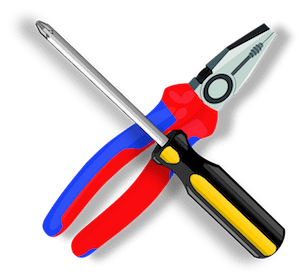It takes a well-maintained HVAC system to keep a home comfortable. Most key HVAC maintenance tasks require the specialized skills of a certified technician, but there are others you should take care of in between yearly professional tuneups. Here's a helpful guide on which heating and cooling system maintenance tasks should be DIY and professional.
DIY Maintenance Chores
The HVAC maintenance chore that should top your DIY list is checking the air filter every month to maintain critical system airflow. If you see any sign of debris on the filter, replace it. Other important chores to tackle include:
- Keeping the supply vents open in all rooms, and making sure that the return vents aren't blocked so air can circulate properly through the system.
- Switching the thermostat setting between "coolingandquot; and "heatandquot; at the beginning of each season, and periodically checking that the fan setting is on "autoandquot; and not "on."
- Doing a periodic check on the condensate drain to make sure it's expelling water properly.
- Trimming back any vegetation in a two-foot radius around the outdoor condenser, keeping yard debris cleaned up around it and giving the coil a gentle monthly rinse off with the garden hose.
Professional HVAC Maintenance Tasks
Having an experienced pro inspect, clean and tune up your HVAC system keeps it operating safely and at maximum efficiency. During routine maintenance, a technician can also identify any emerging issues that need attention before they have an opportunity to escalate into a costly repair or replacement. Here's what you can expect a pro to tackle:
- Cleaning and adjusting the blower unit.
- Cleaning both the evaporator and condenser coils.
- Verifying that the refrigerant is within the manufacturer's specified levels.
- Checking and tightening all electrical connections.
- Testing for correct current and voltage on the fan motors.
- Checking the belts for wear and damage and lubricating the motors.
- Testing the system controls and checking for proper thermostat function.
- Inspecting the A/C condensate drain and flushing it if necessary to clear out any clogs.
Visit our website for in-depth information on most HVAC topics, or just give us a call at (408) 868-5500.
Our goal is to help educate our customers in the South Bay Peninsula and Santa Cruz areas of California about energy and home comfort issues (specific to HVAC systems).

